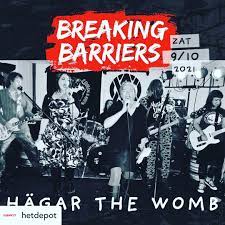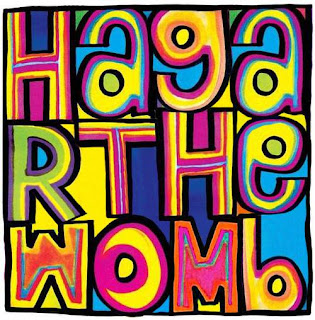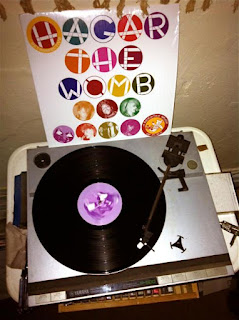On Saturday 20 May we will meet again in the Leuven Depot for Breaking Barriers, the annual punk festival. Hägar The Womb will perform there, together with Pussy Riot and Hetze. Hägar The Womb has been around since 1981. In 1987 they gave up, but in 2011 they decided to re-establish the group with only original members. You can read how things went for them in this interview by Breaking Barriers organizer Malcolm Nix.
 Hägar the Womb have been around for a while. Who's left of the original line-up and where do the replacements come from? Did you find them through a local temp agency or did they come with their own pedigree in the punk scene?
Hägar the Womb have been around for a while. Who's left of the original line-up and where do the replacements come from? Did you find them through a local temp agency or did they come with their own pedigree in the punk scene? Hägar the Womb formed in 1981 and split in 1987. When we reformed in 2011 (after getting together to agree the release of a retrospective LP on American label Mississippi Records), we were one of the very few 80s bands who reformed with ALL of their original line-up. We’ve recently lost our guitarist Steph but have welcomed Lorna from London band Rabies Babies in her place. Lorna was down at the front dancing to us in the 80s so she is a great addition. We also have Mike in to drum when original drummer Chris Liberator goes off to dj around the world (his paying job). Ruth, Paul, Mitch and Karen make up the rest of the band now, as they did then. All the boys were in various bands before the Hags – Cold War, Snork Maidens and Flack amongst others. The girls however, had to be encouraged onto the stage. Not one of them had considered performing before but were greatly supported by people who were too drunk to know better.
I won't ask you to explain the band name, but I noticed this is your second time around. The band split in 1987 and then reformed in 2011. Was there a specific reason to split up or did you all just have enough of it for a while?
Thank you for not asking for an explanation of the band name as there isn’t one – which hasn’t stopped that question being asked at every interview (smiley face). We had to make up a name in a hurry because we had been offered a gig and we didn’t have any of the trappings of a band – instruments, songs – and name! I can’t say why that one stuck from the more and more rubbish names that were being suggested, it had no meaning but we have been informed of several over the years as people try and make sense of it – ranging from biblical references to cartoon characters.
We had several little splits before 1987, losing one or two band members each time for various reasons and several new members coming and going until in 1987 Janet and Ruth were the only original band members left. It seemed a good idea to stop completely then.
 We're of course very happy you have reformed, but a lot has changed since 1981, the year of the band's official inception. What do you consider the biggest difference for better and for worse?
We're of course very happy you have reformed, but a lot has changed since 1981, the year of the band's official inception. What do you consider the biggest difference for better and for worse? Thank you for being happy, we are too! What feels different now is playing is so much FUN now; this wasn’t a word much used in the serious UK anarcho-punk circles of the 80s where we were criticised for not wearing black like most bands at the time, and for having light-hearted songs like ‘Dressed to Kill’ as well as those about heavy issues affecting us all. Now we feel much freer being ourselves. I think also that as we are more ‘mature’ now (the band has a collective age of approximately 330). We just don’t care how we come across or if we fuck up - which is often. In fact, we have turned fucking-up into an art-form, the audience have come to expect it!
You have even released some new material, including the very nice 10” 'Hagitate'. Do you think you're able to reach a new audience or are these records mainly bought by old friends? Do you think there are still young people who want to listen to this kind of music?
We’d be pleased if the material we have released is bought by the generation who grew up with us in the 80s but we are even happier that we have reached across generations and young people seem to enjoy us just as much. For girls in the band, it’s gratifying to see so many more girls involved in punk now than there were back then. When we were young girls, there weren’t many women we could hold up as role-models in our anarchopunk scene or the first wave scene that preceded it. We found inspiration in Vi Subversa from the Poison Girls who was older and had a very powerful stage presence; we always said to each other that we wanted to be like her when we grew up. Now we have young girls coming up and telling us the same thing – it’s great to hear that we can shown what is possible, despite the wrinkles.
It's obviously an unavoidable issue. How did the COVID-19 pandemic affect you and your band? We all remember the various lockdowns, which weren't a bad idea in itself, but are there other, more lasting consequences for the music scene?
COVID crept in at a time in the UK where we were already uncertain of what the implications of Brexit would have on us travelling – we’re still not certain. Along with every other band, we had to have an immediate stop in March 2020 when the first restrictions came in. We were so lucky to have just played an amazing 30 year birthday celebration for Kopi squat in Berlin just before that – many bands never played all year and the year that followed. Restrictions have come and gone and the Hags have managed to play a couple of times between them but it’s always felt like gigs could stop again at any time. Now at the start of 2022, we’re hopeful that despite a slow cautious start because of Omicron, we and all the bands we’ve missed seeing can be reunited again.
 What I find remarkable is that there are a lot of young people protesting against the destruction of the planet and the lack of policy regarding climate change, but the music they listen to doesn't reflect this. Why do you think there are so few politically motivated young artists these days?
What I find remarkable is that there are a lot of young people protesting against the destruction of the planet and the lack of policy regarding climate change, but the music they listen to doesn't reflect this. Why do you think there are so few politically motivated young artists these days? At the risk of sounding like the old people that we are, we have watched the apathy of younger people for decades, thinking: “it wasn’t like that in my day!” It seemed that they didn’t have a protesting bone in their bodies – no one voicing opposition, no one out on the streets or forming movements. From what we’ve seen here in the UK, all that is changing at last! Helped a lot by the recent ‘me too’ and climate change movements – to name just a couple. We only have to look at the line-up of the gigs we play, there are a number of young, switched-on bands who have a LOT to say and do it DIY style just like we did and still do... they may not all sound or look “punk” but they have the attitude and the spirit. It’s so good to see, it gives hope that whatever future we get isn’t achieved through apathy.
Your records were quite successful in the UK Indie charts, but you're still pretty much unknown in large parts of the world. Do you think this is slowly changing? Does the internet provide you with opportunities to familiarize people you've never met with your work?
When we reformed, we thought the internet would open us up to the world but the Hägar the Womb facebook and instagram interactions showed us that – despite being dormant for decades – we had already been opened up. Since reforming and playing abroad, we’ve been constantly surprised that the crowds – young and older - know the words to our songs better than we do! Now we know they will help us out when we forget them. We are happy that now we are more accessible through our online presence, people can talk to us and hear our new or live stuff, not just play the old records. The internet does help us reach out further afield which is great as we are generally rubbish at self-promotion. It was never an aim for us as a DIY band - we had little appetite for (and let’s face it, little chance of) Hag world domination.
On May 20, you're playing at 'Breaking Barriers presents' in Leuven, Belgium. This is your first concert ever in a country that is actually located not far from the shores of Albion. What do you expect from this concert? What do you think will go horribly wrong?
 We expect the finest beers and waffles in the world! And of course, that you will all know the words to our songs better than we do. The only country we ever got to in the 80s apart from the UK was Holland. Even now, we’ve never been to Belgium which makes Breaking Barriers festival all the more special for us. It will be a real treat to see and meet see bands from other countries – Breaking Barriers has a truly international flavour as its name and its ethos suggest. Many things could and do go horribly wrong on and off-stage. I (Ruth) try and ‘manage’ the rest of the Hags but it’s like keeping a lid on a box of frogs – pointless! So we could have problems like keeping upright on stage after too many very fine beers or be downed by excess-waffles, or have travel problems – who knows, we’ll just say Fuck It with capital letters and carry on.
We expect the finest beers and waffles in the world! And of course, that you will all know the words to our songs better than we do. The only country we ever got to in the 80s apart from the UK was Holland. Even now, we’ve never been to Belgium which makes Breaking Barriers festival all the more special for us. It will be a real treat to see and meet see bands from other countries – Breaking Barriers has a truly international flavour as its name and its ethos suggest. Many things could and do go horribly wrong on and off-stage. I (Ruth) try and ‘manage’ the rest of the Hags but it’s like keeping a lid on a box of frogs – pointless! So we could have problems like keeping upright on stage after too many very fine beers or be downed by excess-waffles, or have travel problems – who knows, we’ll just say Fuck It with capital letters and carry on. Having seen you play a few times in the past, I'm under the impression Hagar the Womb are at their best when not completely sober. How drunk will you be during your first Belgian concert? Can we expect another drinking contest with variously flavoured vodka samples or will you just improvise some verbal abuse aimed at your frequently victimised bass player?
Haha you have done your research well. Well, as already indicated - we may not be “completely sober” when we reach the stage. Mitch is the source of our on-stage flavoured vodka shots. He works for the Finnish church in London and manages to get a nice array of imported fine spirits. The last flavoured vodka he got us was chocolate and mint, very strong stuff although it seemed like something you could give a small child. He poured it into 6 cocktail glasses he’d bought with him – he can sometimes be very civilised! As you have seen, poor Mitch does get some ‘attention’ from Karen on stage – verbally and physically. Sometimes she injures him but she never means to.
Finally, do you think the bureaucracy which is a direct result of the whole Brexit-scam will stop alternative British bands playing in Europe? Isn't there a risk a lot of them will simply think it's not worth it anymore?
Our stupid government seems intent on making it difficult for British bands to play in Europe and for visiting bands to come and play in the UK too after Brexit. Its actions during the pandemic have shown that it doesn’t value culture in most forms, especially live music which has had very little support. Where we are now as a result, is trying to build back what we once had. Despite the pandemic and Brexit uncertainties, we hope that we get to play at home and aboard more regularly this year. See you in May!
Interview by Malcolm Nix
Geen opmerkingen:
Een reactie posten